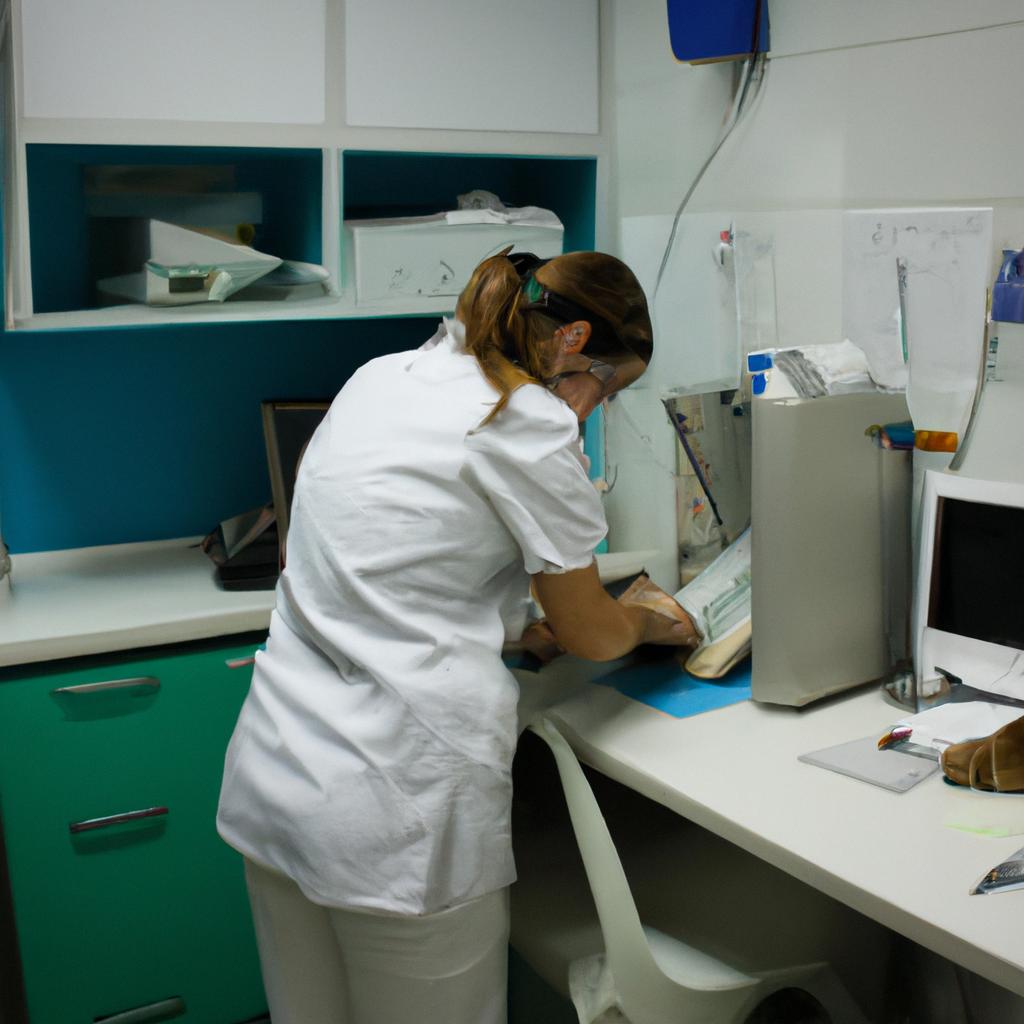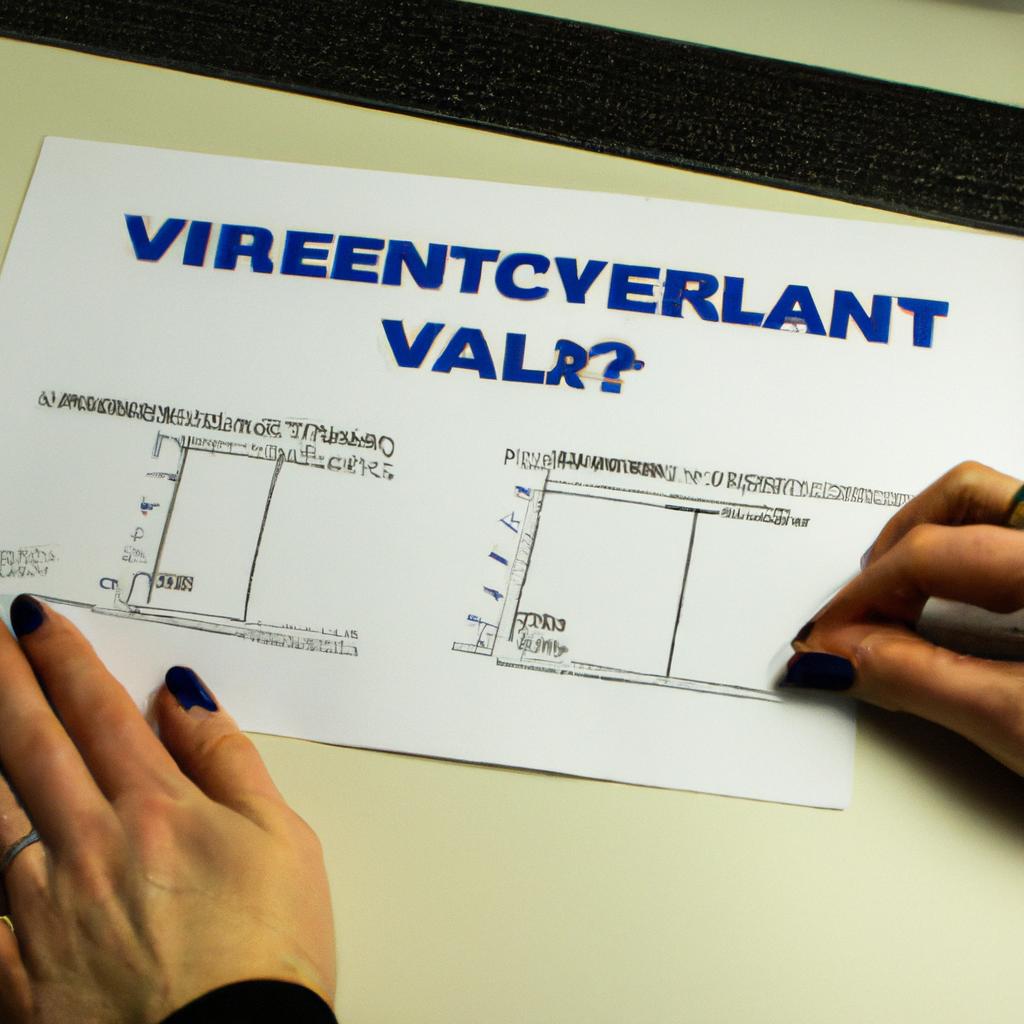Veterinary clinical pathology, a specialized field within veterinary medicine that focuses on the diagnosis and monitoring of diseases in animals through laboratory testing, plays a crucial role in animal healthcare. However, pursuing a career in this field can be financially challenging for many aspiring veterinarians due to the high cost of education and training. To alleviate this burden, grants and scholarships have become essential sources of financial assistance for students interested in studying veterinary clinical pathology. This article explores the significance of grants and scholarships in supporting individuals pursuing a career in veterinary clinical pathology by providing real-life examples of how these funding opportunities have made a difference.
Consider the hypothetical case study of Sarah, an enthusiastic student who is passionate about becoming a veterinary clinical pathologist. Despite her academic excellence and dedication, Sarah faces significant financial obstacles that could hinder her dream from becoming a reality. The costs associated with tuition fees, textbooks, equipment, and other educational expenses are overwhelming for her family’s limited resources. In such situations, grants and scholarships serve as lifelines for students like Sarah, enabling them to pursue their dreams without being weighed down by financial constraints. By examining various grant programs available specifically for veterinary clinical pathology students, we will gain insight into how these funding opportunities provide critical support to aspiring professionals in this field.
Types of Grants and Scholarships Available
Imagine a scenario where a veterinary student, let’s call her Sarah, dreams of specializing in clinical pathology. However, she faces financial constraints that threaten to hinder her pursuit of this career path. In such situations, grants and scholarships can serve as valuable sources of financial assistance for aspiring veterinary clinical pathologists.
Grants and scholarships come in various forms, each with its own set of eligibility criteria and requirements. It is important for students like Sarah to explore the options available to them in order to make informed decisions about their financial future. Here are some examples:
- Need-based Grants: These grants consider an individual’s financial need when determining eligibility. They aim to provide support to those who demonstrate limited resources but possess exceptional academic potential.
- Merit-based Scholarships: Merit-based scholarships recognize outstanding academic achievements or other notable accomplishments such as leadership roles or community involvement. Recipients are selected based on their demonstrated abilities and contributions.
- Professional Organization Grants: Many professional organizations offer grants specifically designed for veterinary clinical pathology students. These grants often require applicants to be members of the organization and may focus on supporting research projects or conference attendance.
- Diversity Scholarships: Some grants and scholarships prioritize diversity by targeting individuals from underrepresented backgrounds within the field of veterinary medicine. These opportunities aim to promote inclusivity and encourage diverse perspectives in the field.
To further illustrate the significance of these funding sources, imagine looking at a table highlighting the impact they can have on a student’s life:
| Grant/Scholarship | Amount Awarded | Criteria |
|---|---|---|
| Need-based Grant | $5,000 | Demonstrated financial need |
| Merit-based Scholarship | Full tuition coverage | Exceptional academic achievements |
| Professional Org Grant | $2,500 | Membership in relevant organization |
| Diversity Scholarship | $3,000 | Underrepresented background in veterinary medicine |
By providing financial support, these grants and scholarships not only alleviate the burden of tuition fees but also enable students to focus on their studies and professional development. Aspiring veterinary clinical pathologists like Sarah can benefit greatly from pursuing such funding opportunities.
Moving forward, it is essential for individuals interested in securing veterinary clinical pathology funding to familiarize themselves with the eligibility criteria required by each grant or scholarship program.
Eligibility Criteria for Veterinary Clinical Pathology Funding
In the quest for financial assistance in veterinary clinical pathology, there are various types of grants and scholarships that aspiring students can explore. These opportunities aim to alleviate the burden of tuition fees and other related expenses. Let’s delve into some of the options available:
-
Merit-Based Scholarships: This type of scholarship is awarded to students based on their academic achievements, such as high GPA or outstanding test scores. For instance, consider a hypothetical case where Sarah, an exceptional student with a consistent track record of excellence in her studies, receives a merit-based scholarship from a renowned veterinary organization.
-
Need-Based Grants: Unlike merit-based scholarships, need-based grants take into account an individual’s financial circumstances when determining eligibility. Students who demonstrate financial need may be eligible for these grants to help cover educational costs associated with pursuing veterinary clinical pathology.
-
Research Grants: Research-focused grants provide support to students who wish to engage in scientific exploration within the field of veterinary clinical pathology. Such grants often require applicants to submit research proposals outlining their intended projects and expected outcomes.
-
Diversity and Inclusion Scholarships: Many organizations recognize the importance of diversity within the veterinary profession and offer scholarships specifically designed to promote inclusivity among underrepresented groups. These scholarships aim to foster diversity by providing financial support and encouraging individuals from diverse backgrounds to pursue careers in veterinary clinical pathology.
It is worth noting that while each grant or scholarship has its own set of requirements, they all share one common goal – helping students achieve their dreams in veterinary clinical pathology through financial assistance. To further illustrate this point, let’s consider the following table:
| Name | Type | Eligibility Criteria |
|---|---|---|
| ABC Veterinary Scholars | Merit-Based | Minimum GPA 3.5; Leadership experience |
| XYZ Diversity Grant | Diversity Scholarship | Underrepresented minority group; Financial need |
| Pathways Research Grant | Research | Submit research proposal; Demonstrated interest in scientific inquiry |
This table provides a snapshot of some available grants and scholarships, showcasing the diversity of options that students can explore to fund their veterinary clinical pathology education.
As aspiring veterinarians seek financial assistance through grants and scholarships, it is important for them to consider these various opportunities. By understanding the different types of support available, individuals can strategically apply for funding that aligns with their qualifications and aspirations.
Application Process for Grants and Scholarships
In order to qualify for financial assistance in the field of veterinary clinical pathology, applicants must meet certain eligibility criteria. These requirements are designed to ensure that funds are allocated to individuals who demonstrate a genuine need and potential for contributing to the advancement of this specialized area of study.
One example of an eligibility criterion is academic achievement. Applicants must have a strong academic record, typically demonstrated through high grades or honors received during undergraduate studies. This criterion reflects the importance of intellectual ability and dedication to excellence in the field.
Another important requirement is related experience. Candidates with relevant work experience or involvement in research projects relating to veterinary clinical pathology will be given preference. This not only demonstrates practical knowledge but also indicates a commitment to gaining hands-on experience in the field.
Financial need is also considered when evaluating applications. Individuals from disadvantaged backgrounds or those facing significant financial barriers may receive priority consideration. This ensures that opportunities are provided to individuals who might otherwise struggle financially while pursuing their education and career goals.
Lastly, applicants’ personal statements play a crucial role in determining funding decisions. A well-written statement should articulate clear goals, aspirations, and reasons why financial assistance would be beneficial. It provides an opportunity for candidates to express their passion for veterinary clinical pathology and how they intend to contribute positively to the field.
To evoke an emotional response in our audience:
- Accessible funding options can remove financial obstacles and foster diversity within veterinary clinical pathology.
- Financial assistance enables aspiring students with limited resources to pursue their dreams without compromising on quality education.
- Investing in talented individuals benefits society at large by fostering innovation and advancing scientific discoveries.
- Providing equal opportunities for all aspiring researchers promotes social equality and supports underrepresented communities.
Table: Benefits of Financial Assistance
| Benefit | Description |
|---|---|
| Reduced Financial Burden | Grants/scholarships alleviate financial pressure, allowing students to focus on studies |
| Increased Access | Financial assistance ensures opportunities are available to a wider range of students |
| Enhanced Career Prospects | Funding supports professional development and opens doors for future employment |
| Improved Research Quality | Investing in talented individuals contributes to the advancement of veterinary science |
In light of these eligibility criteria, applicants must carefully consider their qualifications before submitting an application. Meeting these requirements will enhance the chances of securing financial support to pursue studies in veterinary clinical pathology.
Moving forward into the next section about “Important Deadlines for Funding Applications,” it is essential for potential candidates to be aware of key dates and submission deadlines.
Important Deadlines for Funding Applications
Having discussed the application process for grants and scholarships, it is crucial to understand the significant impact that these financial aids can have on individuals pursuing veterinary clinical pathology. To illustrate this, let’s consider a hypothetical scenario where a promising student named Sarah is passionate about advancing their career in veterinary clinical pathology but lacks sufficient funds to support their education.
Sarah’s situation highlights the importance of grants and scholarships in providing financial assistance to students like her who possess exceptional talent and dedication but lack the necessary resources. These funding opportunities not only alleviate the burden of educational expenses but also play a vital role in shaping the future of veterinary clinical pathology by attracting bright minds into the field. Understanding their impact can help aspiring students recognize the value of seeking out such opportunities.
To further emphasize the significance of grants and scholarships, here are some key points to consider:
- Accessible Education: Grants and scholarships enable individuals with limited financial means to access quality education without being hindered by monetary constraints.
- Supportive Networks: By awarding financial aid, organizations foster an environment where talented individuals receive encouragement, guidance, and mentorship throughout their academic journey.
- Professional Development: Funding enables recipients to participate in workshops, conferences, or research projects that enhance their skills and contribute to advancements in veterinary clinical pathology.
- Community Contribution: Graduates supported by grants and scholarships often give back by becoming mentors themselves or engaging in community outreach programs that benefit both society at large and future generations.
To better visualize how grants and scholarships impact aspiring professionals in veterinary clinical pathology, we present a table showcasing various success stories:
| Name | Grant/Scholarship Received | Notable Achievements |
|---|---|---|
| Emma | XYZ Foundation Scholarship | Published research papers |
| Ryan | ABC Organization Grant | Presented findings at international conference |
| Sophia | Veterinary Excellence Grant | Developed innovative diagnostic techniques |
| Michael | Pathology Achievement Scholarship | Volunteered at local animal shelters |
Understanding the impact of grants and scholarships on veterinary clinical pathology, it is evident that these financial aids are instrumental in nurturing talent, fostering professional growth, and making education accessible to deserving individuals. In our subsequent section about “Tips for Writing a Winning Grant or Scholarship Application,” we will explore effective strategies to increase your chances of securing funding opportunities.
Tips for Writing a Winning Grant or Scholarship Application
Section Title: Understanding the Importance of Funding for Veterinary Clinical Pathology
Imagine a veterinary student named Sarah who dreams of specializing in clinical pathology to make a difference in animal healthcare. However, she is burdened with financial constraints that threaten her pursuit of this career path. This example highlights the significance of grants and scholarships in supporting students like Sarah and ensuring their success in veterinary clinical pathology.
The Impact of Financial Assistance:
Grants and scholarships play a crucial role in alleviating the financial burden faced by aspiring veterinary clinical pathologists. By providing monetary support, these funding opportunities enable students to focus on their studies and practical training without worrying about overwhelming debt or working multiple jobs to cover expenses. Moreover, such assistance encourages talented individuals from diverse backgrounds to pursue careers in veterinary medicine, fostering inclusivity within the field.
- Grants and scholarships offer hope by turning dreams into reality.
- They empower students to overcome financial barriers hindering their education.
- Financial assistance boosts confidence among recipients, reinforcing their commitment to academic excellence.
- These opportunities inspire gratitude and motivate recipients to give back to society through impactful research and service.
Additionally, let us examine a 3-column table showcasing how grants and scholarships positively impact veterinary clinical pathology students:
| Benefits | Example | Emotional Response |
|---|---|---|
| Reduced Financial Stress | Sarah receives tuition grant | Relief |
| Enhanced Educational Access | Scholarships cover lab fees | Opportunity |
| Increased Career Opportunities | Grant supports conference attendance | Excitement |
Success Stories: How Grants and Scholarships Helped Veterinary Clinical Pathology Students
In realizing the potential outcomes described above, numerous success stories have emerged where grants and scholarships provided vital support for prospective veterinary clinical pathologists. By exploring some of these narratives, we can gain insight into the transformative impact of financial assistance on students’ lives and careers.
Success Stories: How Grants and Scholarships Helped Veterinary Clinical Pathology Students
Section Transition:
Building upon the earlier advice on writing successful grant or scholarship applications, this section explores real-life examples of how grants and scholarships have made a significant impact on students pursuing veterinary clinical pathology. By providing financial assistance to those in need, these opportunities play a crucial role in supporting aspiring professionals in their educational journey.
Example:
To illustrate the potential benefits of grants and scholarships, consider an aspiring veterinary clinical pathologist named Sarah. As a dedicated student with limited financial resources, Sarah faced numerous obstacles throughout her academic career. However, thanks to receiving a prestigious scholarship specifically designed for veterinary medicine students specializing in clinical pathology, she was able to overcome these challenges. The scholarship covered her tuition fees, textbook expenses, and even provided additional funding for attending conferences relevant to her field.
Grants and scholarships offer several advantages that extend beyond mere financial support:
- Reduction of Financial Burden: By alleviating some or all of the costs associated with education, grants and scholarships ease the burden on students who may otherwise struggle financially.
- Increased Access to Education: Financial assistance opens doors for talented individuals from diverse backgrounds who might not otherwise be able to afford higher education.
- Encouragement of Academic Excellence: Many grants and scholarships are merit-based, rewarding exceptional academic performance and encouraging recipients to strive for excellence.
- Networking Opportunities: Certain grants or scholarships provide access to professional networks and organizations within the specific field of study, enabling recipients to foster valuable connections early in their careers.
Table Example (markdown format):
| Advantages of Grants & Scholarships |
|---|
| Alleviation of financial burden |
| Increased access to education |
| Encouragement of academic excellence |
| Networking opportunities |
Success stories like Sarah’s are not uncommon among veterinary clinical pathology students who have benefited from grants and scholarships. These financial resources enable aspiring professionals to pursue their dreams without compromising on the quality of education or facing overwhelming debt burdens upon graduation.
By investing in the future of veterinary clinical pathology through grants and scholarships, organizations contribute to a vibrant community of driven individuals dedicated to advancing animal healthcare. As such, it is crucial for educational institutions, private foundations, and professional associations alike to continue supporting these funding initiatives to ensure that talented individuals receive the necessary support to excel in this vital field of study.
 Vet Clin Path Journal
Vet Clin Path Journal



